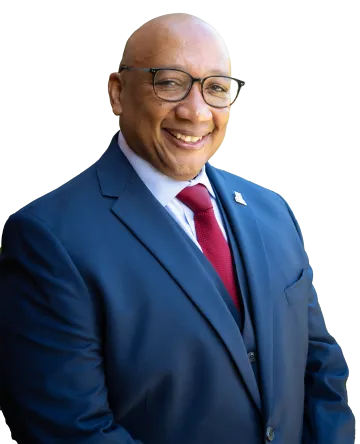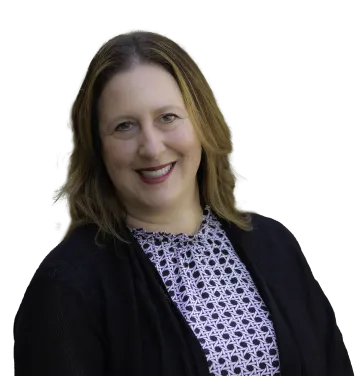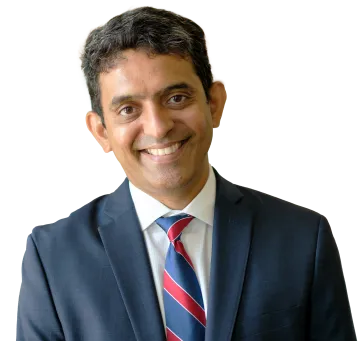Vision 'Sesh' with Three New University Leaders
Berry, Poloni-Staudinger and Kannan contemplate a dean’s role within the university ecosystem.
Dean Robert Q. Berry III of the College of Education is a former K-12 mathematics teacher who says he became a teacher because it was a teacher who saw his own potential. He comes to campus from the University of Virginia, where he served as associate dean for diversity, equity and inclusion and professor of mathematics education. Equity issues in mathematics education are central to his research efforts, which include understanding Black children’s mathematics experiences and unpacking equitable mathematics teaching.

Robert Q. Berry, College of Education
/ Image provided by the College of Education
Q: Why was the College of Education a good fit for you?
A: The College of Education has a strategic plan that aligned professionally with the things I wanted to engage around and has a reputation for knowledge in equity issues in education. The faculty wanted a dean who was thinking about diversity, equity and inclusion and interrogating how DEI shows up in our policies and practices. Having that strategic plan in place and the support of the faculty made my transition smooth. What I’ve been working on is taking that plan and making it actionable. When we say our goal is to build collaboration and community, what are the markers
for success?
Q: What is one innovative program within the college that you think has a lot of potential?
A: The Leadership and Learning Innovation Program. We have a lot of young people who may not want to become teachers but who want to impact their communities by being organizers or working for nonprofits connected to youth development. Oftentimes, we hear “College of Education” and only think of teachers, so I see a huge growth opportunity in educating our students of the multiple career pathways that can come from the education field.
Q: Can you speak to the importance of diversity, equity and inclusion in education as a whole? How do you see the College of Education having a role in promoting those concepts?
A: In terms of representation, when a student enters our college, there should be a faculty member they can connect with and who they see as a mentor or adviser because of the broad representation within our college. The College of Education already has this type of environment, but there is always room to grow.
I also want to think about DEI in programming. When I was associate dean of DEI at Virginia, I started a monthly series called the Collective Learning Series where we focused on topics related to DEI like microaggressions, stereotype threat and deep dives into different identities. DEI creates a lens for us to build a space where we can learn from people in our community with different identities from us.
Q: In five years, what would you like to be able to say you accomplished at the College of Education?
A: I would like to accomplish a lot. I want us to be leaders in education who can respond to shortages in representation. Students need to see themselves in their spaces of learning. I hope that we can be the place people come to because of our strong research and knowledge around representational diversity. I want to have impact broadly, on the community — not just in education but outside of education as well.
Dean Lori Poloni-Staudinger of the College of Social and Behavioral Sciences conceives of a “university of the future” wherein every discipline is embraced for the skills it encourages in curious minds. Her journey has included stops in Colorado and Indiana; most recently, she served at Northern Arizona University, also as faculty and dean. She brought a dedication to access, inclusion and leadership that she has honed throughout her career to SBS.

Lori Poloni-Staudinger, College of Social and Behavioral Sciences
/ Image provided by the College of Social and Behavioral Sciences
Q: How would you describe the ideal role of a dean?
A: I mean, you’re the CEO of your college. You’re the leader of your college, and your role is to help shape and help draw out in the people in your college what their goals, beliefs and values are — and then to lead in a way that promotes those, while being in congruence with the larger university mission,
goals and values.
When I was in fourth grade, we did this character-education exercise about hot air balloons. One was up front, leading, and they were getting smaller and farther away. You were supposed to think about where you were most comfortable. The dean is both the balloon at the front and the balloon at the back, leading and setting a direction forward but also playing a support role for students and faculty to achieve their goals and to move the entire institution forward. You’re playing both roles — sometimes at the same time. Even then, in fourth grade, I circled the balloon in the front and the balloon at the end.
Q: How has public education changed your life?
A: My grandparents were all immigrants — three from Italy, one from England. The one with the most education went to eighth grade, and it was my grandmother from England. Within two generations, they have a grandchild sitting in a dean’s office in a major research institution. We should be providing the same opportunities to the people coming behind me.
Q: What have you explored in your own scholarship?
A: When girls and boys are really little, they say with equal numbers that they want to be president. That starts to diverge in high school and becomes more acute in college, with those who are male-identifying significantly more likely to say they see themselves moving into political leadership. I co-authored “Why Don’t Women Rule the World?” to increase political ambition among people who are female-identifying.
Q: What do you do when you’re not at work?
A: I like everything and anything to do with water, which is not lost on me — I’ve spent a couple decades in a desert environment, high desert and low desert. I really like paddleboarding. I ski. I like boating, swimming. Any kind of water-based activity is usually my favorite thing to be doing.
Q: What are your goals for SBS?
A: One is to articulate the value of the social and humanistic sciences: their independent value and the value to society and students in pursuit of career goals. When you look at what employers want out of the next generation, it is the ability to communicate in writing and orally, critical thinking skills, entrepreneurial thinking and resiliency. Those are skills we teach across our degree programs.
Dean Karthik Kannan of the Eller College of Management comes to Tucson from Purdue University, where he taught management and served as associate dean for partnerships at the Krannert School of Management, director of the Krenicki Center for Business Analytics and Machine Learning, and the Thomas Howatt Chair in Management. In addition to a doctorate in information systems, Kannan earned master’s degrees in electrical and computer engineering as well as in public policy and management. He has a three-pillar plan for amplifying Eller’s prominence: creating impactful research platforms, investing in the next generation of education systems and developing corporate and community engagement platforms.

Karthik Kannan, Eller College of Management
/ Image provided by the Eller College of Management
Q: What are some of the throughlines of your academic passions?
A: At the end of the day, any strategy we pursue has to be broad enough to take different perspectives but also deep enough to have an impact. Engineering gives you a very quantitative ability, public policy gives you an economic perspective and being in a business school gives you the impact aspect. And so, if you think of these approaches as overlapping circles, I think of myself as being at the intersection.
Q: What brought you to the university and motivated you to serve as the dean of Eller?
A: Eller is a fantastic place. You have people like Nobel laureate Vernon Smith, who did seminal work here. You have Dan Dhaliwal, one of the intellectual giants for whom the accounting department is named, as well as Jay Nunamaker, who founded the management information systems department. There are so many people who have been a part of Eller who are not only gems but created an ecosystem for a strong business school in their own discipline. So, the potential at this university is great. The location is fantastic — there is huge potential for us to grow as a top university in the state. We’ll see more population growth here than in the Midwest or Northeast. All of these elements considered, Eller is positioned to become a thriving ground for success in the future.
Q: How do you see your role as dean?
A: First, it’s acting as a bridge between the college and the central administration. My role is to act as a conduit and an interpreter between these two entities. Second, I don’t know if people have considered the origin of the word “decide.” We know about “fungicide,” “insecticide,” “regicide” and all that, so we know “cide” is “to kill,” right? “Decide” can be thought of as cutting too many options and directing something in a certain pathway. Oftentimes, there are different stakeholders and people who want to take the school in a certain direction, which they think is the right way to go — and that may all be true, but given the uncertainty with regard to some decisions, somebody has to make the call. That’s part of the role that the dean will have to play. Overall, I think of it as being in partnership with the departments because it’s a collaborative environment.
Q: Do you have any favorite spots in town or on campus?
A: I really love the Catalina mountains. They’re spectacular. We have just seen a little bit of Sabino Canyon, and we look forward to seeing more of it.
